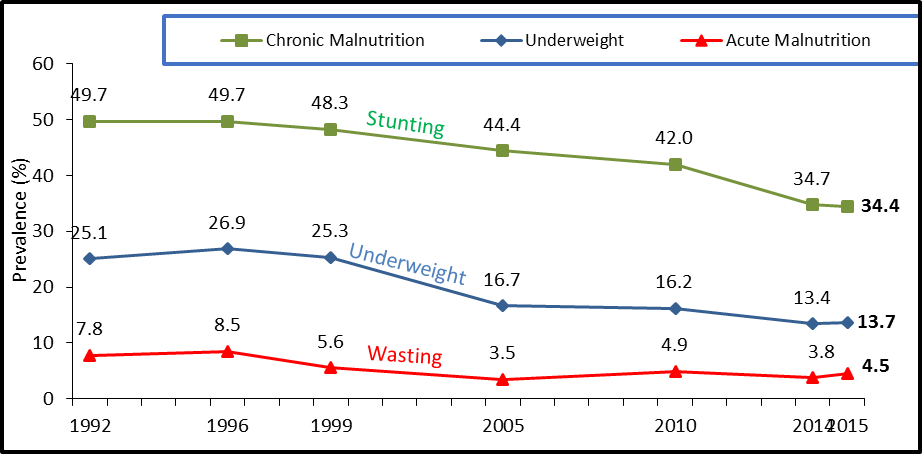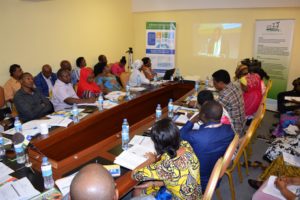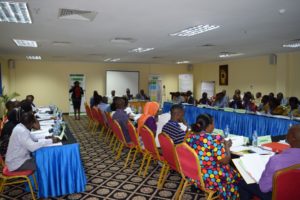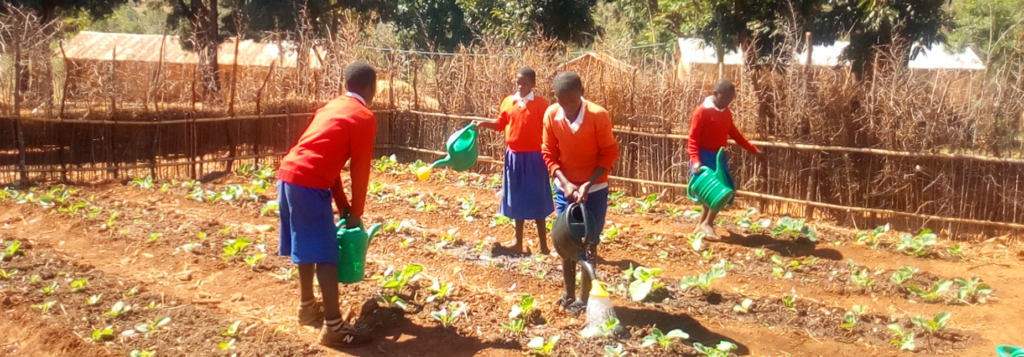Tanzania: taking accountability to the next level
PANITA’s role in developing accountability structures for nutrition at all levels 1. Introduction Despite increasing efforts since 2010, malnutrition persists in Tanzania. with particular impact on children under five, and women of child-bearing age. Between 2010 and 2015/16, stunting in children under five years of…
PANITA’s role in developing accountability structures for nutrition at all levels
1. Introduction
Despite increasing efforts since 2010, malnutrition persists in Tanzania. with particular impact on children under five, and women of child-bearing age. Between 2010 and 2015/16, stunting in children under five years of age reduced from 42% to 34%, but anaemia remained at 57% for children under five and increased from 40 to 45% for women in their reproductive ages (15-49 years) (TDHS 2015/16).
Tanzania’s high population growth rate (2.7% per annum) means the absolute numbers of stunted children increased from 2.7 million in 2010 to about 3.0 million in 2015/16 out of an estimated number of 8.9 million children under five years. At the same time, some 4.8% of children are acutely malnourished (wasted) – with half of these severely wasted. As in many countries, Tanzania is facing a double malnutrition burden where over-nutrition in adults is shown in rising levels of overweight, obesity and diet related non-communicable diseases (DRNCDs) such as diabetes. The prevalence of overweight/obesity in women aged 15-49 years nearly trebled from 11% in 1991 to 28% in 2015/16 (TDHS 2015/16)
 Graph 1: Trends in nutrition status of children under five years in Tanzania 1991-2016
Graph 1: Trends in nutrition status of children under five years in Tanzania 1991-2016
(Source: WHO Global data base)
Since 2010, nutrition has received sustained political support in Tanzania, with high engagement with the Scaling Up Nutrition (SUN) Movement. In 2011, a National Nutrition Strategy was published and Regional and Council Multi-sectoral Steering Committees on Nutrition (R&C-MSCN) were established. In 2014, Joint Multi-sectoral Nutrition Reviews (JMNRs) started. In 2016, an evidence-based strategic National Multi-sectoral Nutrition Action Plan (NMNAP) was published. Performance Contracts for nutrition were created in 2017, setting out the nutrition responsibilities of regional governments and lines of reporting. A standard Terms of Reference for Multi-sectoral Steering Committees on Nutrition were put in place in September 2017, which defined nutrition responsibilities at Regional, District and Ward levels.
2. Developing internal governance and accountability
Partnership for Nutrition in Tanzania (PANITA) is a coalition of over 300 Civil Society Organisations (CSOs) based in both Tanzania Mainland and Zanzibar. Its members work in a wide range of sectors impacting nutrition. PANITA was established in 2010 with technical and financial support from Save the Children International (SCI), UNICEF and Irish Aid – and became an independent legal entity in 2013, thanks to on-going financial support from Irish Aid and membership contributions.
PANITA has become a well-established civil society voice on nutrition in Tanzania, with a representation on Tanzania’s High-Level Nutrition Steering Committee, the Joint Multi-sectoral Nutrition Annual Review Meeting (JMNR), and the Technical Working Group for Nutrition. Its Members participate in Multi sectoral Nutrition Steering Committees at Regional and Council levels. PANITA is the official SUN movement civil society alliance for Tanzania and one of the largest and longest-established members of the SUN Civil Society Network.
PANITA has worked in two principal spheres: externally, with the aim of influencing the government, the media and other key actors to prioritise nutrition; and internally, within its own membership network, to increase the capacity of CSOs on nutrition and to build and improve coordination and reporting structures so the network is effective, transparent and accountable.
“One of the biggest things I have learnt, is that we can only have legitimacy in front of government if we are clean,” says Tumaini Mikindo Executive Director of PANITA. “We have worked hard at increasing our transparency at a national level and at the same time, we have worked hard to develop open reporting at all levels. There wasn’t a culture for our member CSOs to share information on their nutrition activities and spending. It was really hard, we had to go a long way to explain why and what information we wanted and gradually establish more trust.”
Capacity building and training have helped to build accountability and trust. Other mechanisms have helped, such as strong conflict of interest policies and internal rules to ensure fair competition for funding among PANITA members. Cascade communication has also played an important role in establishing transparency and trust.
Daniel Mtweve is PANITA’s zonal coordinator for the South-western Highlands, responsible for four regions in the south Western border area of Tanzania (the country has 31 administrative regions in total). He is also a senior representative of one of PANITA’s long-standing CSO members – Community Economic Empowerment and Legal Support (CEELS).
“CEELS wasn’t engaged in work in nutrition at all when I started there, we were working in HIV and Aids principally. But through training and mentoring from PANITA, our focus changed and CEELS began engaging with government at local and regional level on nutrition, and work with Regional and Council Nutrition Steering Committees.”
3. Advocating for national accountability
PANITA’s advocacy efforts aimed at influencing policy at a national level have seen some notable successes over the last five years. One of these was achieved in the run up to the 2015 general election in Tanzania, where PANITA worked with the Parliamentary Group on Nutrition, Food Security and Child Rights (PGNFSCR) to ensure that the more than 20 political parties included commitments on nutrition in their manifestos. PANITA worked with the parliamentarians to understand the NMNAP 2016/21 strategy and to push for nutrition spending to be ring-fenced.
“Through our strong links with this parliamentary group, we were able to develop their capacity so they can speak out for nutrition during parliamentary debates,” says Jane Msagati, PANITA’s Program Coordinator. “As a result of our collaboration with the parliamentary group, every party developed a position on nutrition that was relevant to their agenda.”
The parliamentarians group issued a call to action for all political parties to include commitments on nutrition in their manifestos in line with the 2011 National Nutrition Strategy – with monitoring of nutrition spend a priority area. This would mean having “fully functional governance structures from national to district levels, specific interventions such as district planning and budgeting processes which address nutrition [… as well as] clear responsibilities and accountabilities for the key actors and implementers.”
Recruiting a high-level champion
PANITA used the 2016 launch of the Global Nutrition Report in July 2016 to invite the Vice President of Tanzania, Her Excellency Samia Suluhu, to become a nutrition champion, a role she readily accepted. While PANITA used the national GNR event, and regional launch events around the country, to keep nutrition on the political agenda, having a high ranking ally in the Vice President proved to be extremely valuable when it came to putting pressure on government to deliver on commitments made.
At a later event, the 2017 National Summit on Food Fortification, Her Excellency Samia Suluhu promised to sign performance contract with regional commissioners to ensure that funding allocated for nutrition activities was paid on time and in full (see section 5 on Performance Contracts). “It has been so valuable to have the Vice President as a champion for nutrition,” says Jane Msagati. “She understands the impact of malnutrition on under 5s and women, and we hope she will advise the president and other national leaders to invest in nutrition.”
Training journalists and religious leaders
 PANITA’s advocacy strategy includes training for journalists and an award scheme for excellence in reporting on nutrition, which was attended by senior government officials and other important influencers. The awards ceremony received national media coverage. PANITA has also worked with national religious leaders from both the Islamic and Christian faiths to develop relationships and explore ways that they could engage in fighting malnutrition in the country. The leaders helped to identify messages in the teachings of both faiths that promoted proper nutrition practices and the leaders agreed to spread nutrition messages further.
PANITA’s advocacy strategy includes training for journalists and an award scheme for excellence in reporting on nutrition, which was attended by senior government officials and other important influencers. The awards ceremony received national media coverage. PANITA has also worked with national religious leaders from both the Islamic and Christian faiths to develop relationships and explore ways that they could engage in fighting malnutrition in the country. The leaders helped to identify messages in the teachings of both faiths that promoted proper nutrition practices and the leaders agreed to spread nutrition messages further.
4. Building accountability at Regional and District level
In September 2017, PANITA had formal recognition of its role as the leading voice of civil society in Tanzania on nutrition issues. During the Joint Multi-sectoral Nutrition Review (JMNR), which brought together ministries with nutrition-sensitive responsibilities with other nutrition actors, it was decided that PANITA would be the official agency responsible for collecting data on the nutrition activities of CSOs and INGOs across the whole country.
PANITA achieved this position within six years of being founded by steadily developing its membership, its coordination structures, and the network’s own accountability mechanisms. PANITA operates in all regions in Tanzania, dividing the country into 10 geographical zones. Each zone has a nominated coordinator who acts as a bridge between the secretariat and PANITA headquarters and members in that zone. Coordinators are actively involved in recruiting new CSO members, and in coordinating, monitoring and evaluating activities.
PANITA’s national reach means it can: identify gaps in coverage; monitor levels of investment; identify useful innovations; and know what resources and skills are available in every part of the country. PANITA also work with donors to find CSO partners with particular skillsets in a particular region. Sometimes PANITA facilitates tender processes on behalf of donors, carefully governed by its rules on internal competition. Since the 2017 JNMR, PANITA has begun piloting a more sophisticated data collection tool to track members’ nutrition activities and spending with higher frequency.
Tanzania established Multi-sectoral Nutrition Steering Committees at Regional and Council level in 2011. In each Region and Council, PANITA members are represented and participate in these committees – providing information gathered in communities by local CSOs, ensuring that civil society’s voice is heard, coordinating efforts with other actors, and agreeing priorities for the Council or Region. The Regional and Council committees report upwards to central government and downwards to Ward and Village level – and PANITA’s representatives at all levels do the same within their network.
5. Taking accountability to the next level
In 2016, PANITA participated in SUN CSN’s Africa Learning Route – a peer-to-peer exchange visit for civil society representatives from nine sub Saharan countries. Building on an established methodology developed by PROCASUR, the learning visit was hosted by the SUN Civil Society Alliance in Rwanda, a country which has made significant progress on nutrition in the last decade. Representatives of PANITA Secretariat Staff, and two member CSOs made up the delegation from Tanzania – among them Daniel Mtweve of CEELS.
The visit showcased Rwanda’s use of performance contracts to increase the accountability and effectiveness of agreed nutrition-related plans at local level. The contracts formalised the relationship between and roles of different nutrition actors. By the end of the visit, the PANITA representatives concluded performance contracts were, as Daniel Mtweve puts it, a good way of “getting more out of existing structures to get higher impact in communities.”
Piloting Performance Contracts
With seed funding from a SUN CSN award scheme, in 2017 PANITA piloted the use of performance contracts in Kalambo District and Kisumba Ward. PANITA worked with nutrition actors in the South-Western Highland zone (including the District Development Officer and District nutritionist) to build capacity, and strengthen planning and accountability in the District’s nutrition steering committee. This work was then rolled out in Kisumba Ward. At the end of the process, 21 different local nutrition stakeholders had committed to a performance agreement. At Ward and Village level, the stakeholders agreed to “walk the talk” by establishing vegetable garden at the school and at their own homes. The ‘contracts’ agreed roles and actions but were not legally enforceable (unlike the long-established performance contracts in Rwanda).
 While PANITA was trialling a ‘bottom up’ approach to making different nutrition actors accountable, at national level the government was developing its own ‘top down’ performance contract. The contracts are between the President’s Office for Regional Administration and Local government (POLRAG) and the Regional Commissioners. The contracts were launched in 2017 and at the time of writing the Commissioners of 26 Regions had signed them.
While PANITA was trialling a ‘bottom up’ approach to making different nutrition actors accountable, at national level the government was developing its own ‘top down’ performance contract. The contracts are between the President’s Office for Regional Administration and Local government (POLRAG) and the Regional Commissioners. The contracts were launched in 2017 and at the time of writing the Commissioners of 26 Regions had signed them.
Though PANITA does not claim to have directly inspired the government’s performance contracts, there is a connection between the two initiatives. A regional administrative secretary, who chaired the regional multi-sectoral nutrition steering committee and had been trained by PANITA, was been transferred to the capital Dodoma to become a Deputy Secretary at the ministry of PORALG (Education).
“Mr Tixon Nzunda has been very supportive of our work to increase nutrition accountability at regional and district level,” says Daniel. Soon after his transfer the government started work on its own performance contracts. “We don’t know if there is connection or if it is a coincidence, but at the same time we were working tirelessly with parliamentarians and government officials, and already had recruited the Vice President to be a nutrition champion. Taking all this into account, we feel strongly that we played a role in making this happen.”
Building a national framework for accountability
The performance contract that PANITA piloted and the one the government subsequently launched are important in establishing the framework for accountability, but both suffer from not being easy to enforce. The government has acted to address this issue, drafting a standard Terms of Reference for the Multi-sectorial Steering Committees on Nutrition at all levels down to Ward and Village development committee level.
“The Terms of Reference is key,” says Daniel Mtweve. “The performance contracts are important but are quite general and you could not use one to hold a nutrition steering committee to account, but the Terms of Reference makes them accountable, it has performance indicators – and it has a section that defines a role for civil society.”
Supporting the government’s accountability efforts, the Tanzania Food Nutrition Centre (TFNC) has developed scorecards designed to track the progress of nutrition interventions. The information from the scorecards will be aggregated by district on a monthly basis and reported to the national body, which will then be able to do identify gaps and bottlenecks by region and district. PANITA, in partnership with the Institute of Development Studies, has also been developing scorecards and trialling them in the Morogoro and Kigoma district. The aim is to develop potential indicators of district-level political commitment to nutrition – and the project outcomes are being shared with the TFNC and may inform further development of the national scorecards. The work draws on the approaches IDS has developed over the last 3 years as part of the Hunger and Nutrition Commitment Index work.
The scorecards mark another important milestone in improving accountability in Tanzania. PANITA is training member CSOs in budget advocacy and budget tracking exercises at national level. The aim is to cascade these skills to district and ward level so there is local capacity to track nutrition spend and check that the fund allocated are reaching the communities they should be reaching. PANITA members will pilot the scorecards.
6. Lessons learned and next steps for PANITA
In the eight years since it was founded, PANITA has built an effective platform for civil society covering the whole country – and it is in a good position to play a key oversight role for nutrition interventions and spending in many communities.
Program Coordinator Jane Msagati has been part of PANITA since the beginning. “For me, a major highlight of our work has been the support we have given our members. Many of them are very small CSOs, and we developed their capacity on nutrition, on advocacy, and on nutrition interventions. The strength of this platform is through its members and we are proud of what they are now able to do.”
The worst cases on malnutrition are found in Tanzania’s remote rural areas. “Our work at regional and national level has been important and we have made sure nutrition is high on the agenda,” says Jane Msagati. “But the real challenges are in the communities, where malnutrition is found, and where the allocated funds are not being received. By working with our members so they have better entry points with different authorities and by enhancing their advocacy skills we will increase their capacity to hold the authorities to account. The performance contracts and ToRs will be powerful tools for our members and all nutrition actors in the country.”
 Executive Director Tumaini Mikindo agrees: “Making sure we get accountability from national level to the local level is the challenge. Trying to link the advocacy and implementation is where the really big work is. We don’t want to just be making noise, we want to move accountability to sub national level, and we need to make sure that our members take on that piece, for instance by piloting how best to use the scorecard.”
Executive Director Tumaini Mikindo agrees: “Making sure we get accountability from national level to the local level is the challenge. Trying to link the advocacy and implementation is where the really big work is. We don’t want to just be making noise, we want to move accountability to sub national level, and we need to make sure that our members take on that piece, for instance by piloting how best to use the scorecard.”
Tanzania now has very good national multi-stakeholder platforms and policies, Tumaini says. “But at local and council level some of these platforms are very inefficient. We participated fully in reviewing the ToR and the comprehensive supportive supervision toolkit, and these tools will strengthen the platforms and the scorecard will also help.”
PANITA’s member CSOs will help address the data gap at community level. “The real trouble is in getting data at the local level. It was hard to extract information from local Councils; it was secret, now we have a mechanism and tools in place for accessing data such as nutrition score card, bottleneck analysis and JMNR Reports that facilitate access to information including financial data. Resource mobilisation tracking is key and these new tools will add value to our accountability mechanisms. We have to empower our CSOs to leverage those mechanisms and gather the data.”
Key achievements
- Ensured all political parties included nutrition in their 2015 election manifestos.
- Supported review of Parliamentarians Group on Nutrition Food Security and Children Rights Strategic Plan 2018 – 2022.
- Took the opportunity of the launch of the 2016 Global Nutrition Report to recruit Tanzania’s Vice President as a nutrition champion.
- Developed and piloted (2017) a performance contract at district and ward level, with the participation and agreement of more than 20 nutrition stakeholders.
- Participated in development of a national Terms of Reference for multi-sectorial Steering Committees on Nutrition for regions and local governments (2018).
- Ensured PANITA representations in e Regional and District Multi-sectoral Nutrition Steering Committee meetings, resulting in increased nutrition budget allocation by the Local Government Authorities (LGAs).
Lessons learned
- To have credibility with government, donors and others, it is essential to be able to show strong governance and high levels of internal accountability and transparency.
- Taking a long term view of advocacy activities and relationship building is valuable, as a series of small wins can develop into significant achievements.
Future priorities and challenges
- With the national and regional policies and structures in place, the top priority now is improving data collection and accountability at the district, ward and village level.
- PANITA’s CSO have a key role to play in this and while they have improved capacity, lack of resources at local level is a major barrier to developing accountability at community level.
More information
Partnership for Nutrition in Tanzania (PANITA)
Off Rose Garden Road, 6 Rwehabura Road, Plot No. 305A, Mikocheni A
P.O. Box 32095, Dar Es Salaam, Tanzania
Tel: +255 222 701 753
Email: info@panita.or.tz
Web: www.panita.or.tz
Further reading:
Employing Evidence in Policy Advocacy to Mobilise Parliamentarians on Nutrition in Tanzania.
